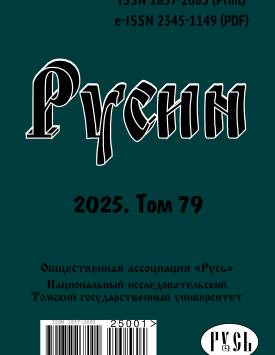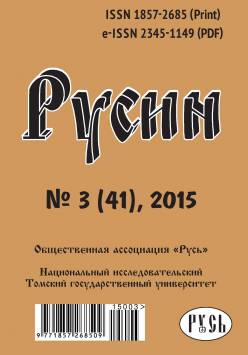Slavic languages in the Slavophile concept of the “ideal folk language” (based on Ivan S. Aksakov’s opinion journalism)
The article analyzes the vocabulary and phraseology of various Slavic languages (Russian, Church Slavonic, Polish, and Ukrainian) in the journalistic texts of Ivan S. Aksakov, whose linguistic choices reflect his ideological commitment to the concept of an “ideal folk language” (ideal’nyy narodnyy yazyk). According to this concept, the standard language of Orthodox Slavic nations constitutes a Russian-Church Slavonic unity based on a synthesis of ancient and modern, secular and religious elements. The ideal folk language was understood by the Slavophiles not only as an expression of the common spiritual and political identity of Slavic peoples but also as a means of actively shaping it. Consequently, they viewed both the creation of a separate Ukrainian literary language and the expansion of Polish in the western provinces of the Russian Empire as threats to the sociopolitical and religious unity of Orthodox Slavs. This study draws on Aksakov's journalistic writings, which played a key role in transforming Slavophilism into a broader sociopolitical movement aimed at a wide readership. The primary material consists of two series of essays focusing on the “Slavic question” and the “Polish question”- topics central to imperial national policy in the 19th century. The article examines the semantic and stylistic characteristics of linguistic devices that embody the ideal folk language in Aksakov's writings. These include, firstly, “stylistic Slavonicisms” -bookish and Church Slavonic vocabulary (including forms archaic for the 19th century), neologisms built on Slavonic models, archaic Russian lexis and phraseology functionally analogous to Slavonicisms, as well as biblical and liturgical quotations; secondly, Russian-origin vocabulary with concrete semantics, including colloquial, vernacular, and dialectal elements, alongside phraseological units and paroemiological material (e.g., proverbs) serving similar rhetorical functions. The analysis also covers Aksakov's use of Ukrainian and Polish inclusions, which serve to represent “another's word” (chuzhoeslovo) in polemics with ideological opponents. The article concludes with findings on the bookish character of the “ideal folk language” in the Slavophile understanding, which presumed a limited use of lexical and phraseological means with concrete semantics, of a colloquial and vernacular nature, as well as the functional limitations of inclusions from Ukrainian and Polish.
Keywords
the 19th-century Russian language, the 19th-century journalism, historical stylistics, foreign inclusions, Polish, Ukrainian, Church Slavonic, Slavophilism, Ivan S. AksakovAuthors
| Name | Organization | |
| Sekiro Olga O. | Institute for Linguistic Studies of the Russian Academy of Sciences | olgasekiro@yandex.ru |
References

Slavic languages in the Slavophile concept of the “ideal folk language” (based on Ivan S. Aksakov’s opinion journalism) | Rusin. 2025. № 79. DOI: 10.17223/18572685/79/7
